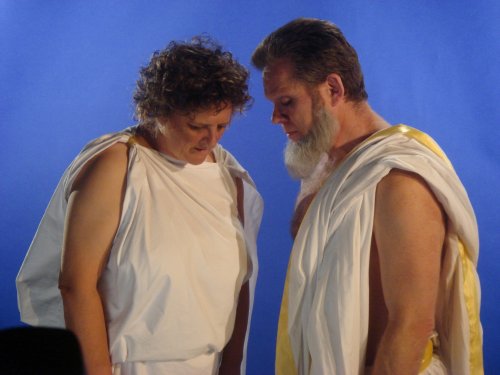
The legend, as told by Ovid, is that Echo loves Narcissus but is unable to express that love because she does not have a voice of her own, and Narcissus is unable to hear and respond to her call, because he is trapped within self love, and his own image. Echo is all sound – only her “echo” remains after her death – and Narcissus is all image, and this seemed to me a very good basis for constructing an installation using sound and image in a formally innovative way. My initial thoughts were to create a Bill Viola like installation using slow motion and high definition images with Narcissus at one end of the video space, captured in his own image, looking into a pool, in slow motion, and expressing love for himself, whilst Echo at the other end echoes his call of love and opens her arms towards him. The sound world would then be open for the spectators sounds also to be echoed. However, although this speaks to the reflexivity of gallery video work, I decided that the piece needed more context and more of a story, and I decided to use film craft skills of myself and my collaborators to create a narrative piece. The piece needed more space for the narration and became a five screen installation, with screens surrounding the audience on all sides, where for, I believe, the first time, the five screens create a coherent imaginary space where characters interact in a number of interesting ways.
The theme of Echo and Narcissus is the need to overcome narcissism in a hyper mediated age. At the time of the conception of the piece, the Second Gulf War was taking place, and I knew no one who agreed with the policies of the Allies – there was a great feeling of political impotence, particularly in the face of the media. Echo, with her voice dictated by those of others, and Narcissus’s self involvement were powerful emblems of our lack of agency in the face of wrong, and the Gods Hera and Zeus, who reduce them to this position, symptomatic of the arbitrary nature of current political discourse. I therefore made Zeus and Hera control a mediatized world – they have a television remote control through which they see and control the human world. I also wanted to show that we are not completely powerless in the face of abusive power, but have some chances of speaking discourse differently. I therefore created new endings for Echo and Narcissus where, despite the seeming lack of choice they face, they do manage to surmount their difficulties and change the world. However, the endings are not conventionally “happy” or even totally controlled by the characters, but are “performative” in Judith Butler’s sense of the word. The audience have to choose for the characters, and their choices will then bring up unexpected results, which are nevertheless better than choosing to do nothing, a choice which results in the characters’ death.